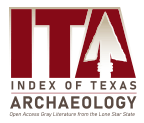Home > Research Projects and Centers > Center for Regional Heritage Research > Index of Texas Archaeology > Vol.
Agency
Texas Historical Commission
Abstract
In April of 2015, AmaTerra Environmental, Inc. staff conducted intensive cultural resource investigations of approximately 78 acres of proposed expansions to the City of Kerrville’s existing Kerrville Landfill in Kerr County, Texas. Working on behalf of the City of Kerrville (the land owner and project sponsor) and their design consultant LNV, Inc., AmaTerra investigated portions of the Landfill’s proposed Western Expansion Area (36.5 acres) and the Big Hill Expansion Area (41.5 acres) for compliance with Section 106 of the National Historic Preservation Act of 1966 (as amended) and the Antiquities Code of Texas (Antiquities Permit 7238). Within undisturbed and previously-unsurveyed portions of the Big Hill Expansion Area, archeologists conducted intensive area survey and excavated 17 subsurface shovel tests, finding the expansion area composed of shallow, deflated, upland soils. Previously recorded Site 41KR673, a diffuse prehistoric surface scatter of non-diagnostic tools and lithic debris was expanded to encompass approximately 15 acres of the Big Hill Expansion Area.
The proposed Western Expansion Area was surveyed previously, hence, archeologists focused on intensive survey and limited NRHP/SAL-eligibility testing of a previously recorded prehistoric site, Site 41KR501. Nine backhoe trenches were excavated within the site area. These yielded seven flakes and three burned rock fragments in three of the trenches. All of the artifacts were found within secondary, high-energy, flood-related contexts (or subsurface disturbance) ranging from 70 to 210 centimeters below the surface. A small surface scatter of burned rock was also observed near the site’s southern boundary. No evidence of intact features was observed. Given the lack of temporal diagnostics, very minimal artifacts, and the resulting poor level of research potential, Sites 41KR501 and 41KR673 are recommended as not eligible for listing in the National Register of Historic Places or as a State Antiquities Landmarks. Accordingly, AmaTerra recommends that the project proceed with no adverse effects to Historic Properties and/or State Antiquities Landmarks and no further work necessary. No artifacts were collected during the survey but all field-generated notes, forms, and photographs will be permanently curated at the Texas Archeological Research Laboratory in Austin.
Creative Commons License

This work is licensed under a Creative Commons Attribution-NonCommercial 4.0 International License
Included in
American Material Culture Commons, Archaeological Anthropology Commons, Environmental Studies Commons, Other American Studies Commons, Other Arts and Humanities Commons, Other History of Art, Architecture, and Archaeology Commons, United States History Commons
Submission Location
Tell us how this article helped you.


